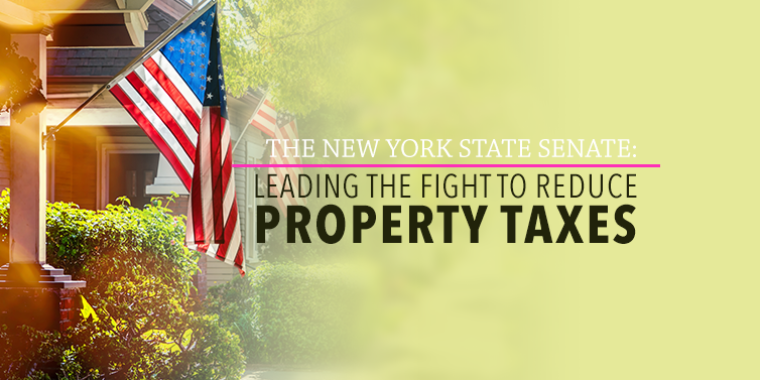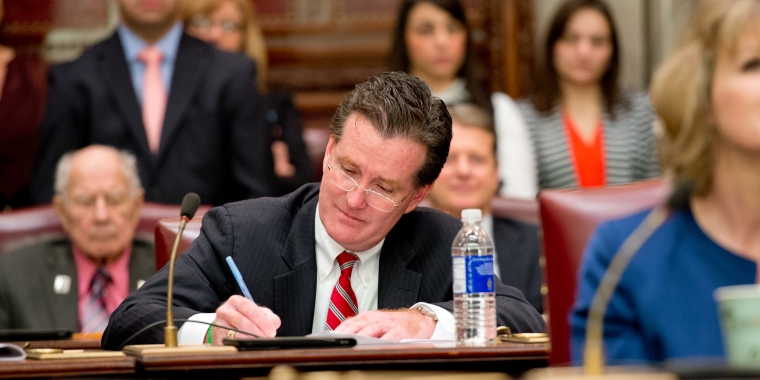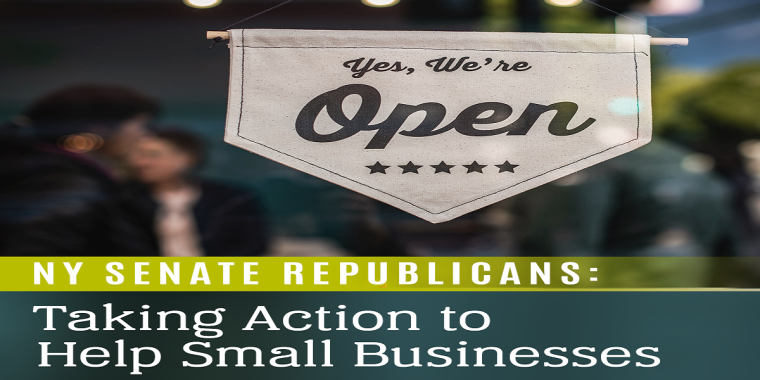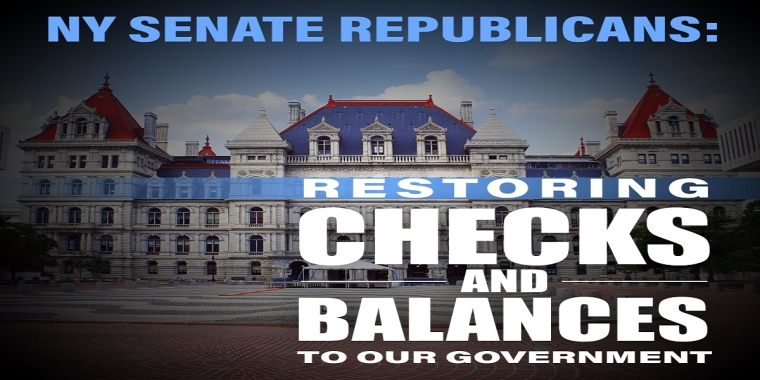
New York Senate Majority Continues Efforts To Make New York More Affordable By Cutting Billions Of Dollars In Local Property Taxes And Other Tax Burdens
May 7, 2018

The New York State Senate has passed a sweeping affordability package that focuses on property taxes, energy costs, unfunded mandates, and other drivers that are making it harder for middle-class families to succeed. The measures would result in billions of dollars in savings annually for taxpayers in the form of new and expanded property tax cuts – including the state assuming local Medicaid costs; eliminating costly energy taxes; creating new tax cuts for seniors to prevent them from moving to another state; requiring a supermajority vote when taxes are increased by state and local governments; and preventing unfunded mandates from being passed on to the taxpayer.
Senate Majority Leader John J. Flanagan said, “Time and again, my colleagues and I hear about how taxes are preventing New Yorkers from getting ahead and making it more attractive to leave this great state for seemingly better opportunities. The Senate Republican Majority Conference is once again acting in the best interests of taxpayers by putting forth a multi-billion-dollar tax savings package that helps them keep more of their hard-earned money and makes them want to stay here to invest in a brighter future. While the Governor and the Legislature’s Democrats have given up on making the state more affordable, we’re providing real solutions to people’s concerns and helping all New Yorkers achieve their dreams of a better life.”
Cutting Local Medicaid Contributions to Give Direct Property Tax Relief
The largest savings from this package comes from two initiatives that require the state to assume the local share of Medicaid payments. Since the enactment of the Medicaid program in 1965, counties and the City of New York have been required to share in both its cost and administrative operation. The State is responsible for program design and, over the course of several years, the overall administration of the program has been gradually shifting to the state. The counties’ Medicaid share is currently capped at 2015 levels and the current local contribution amount to the state for Medicaid is a combined statewide total of $7.63 billion.
The first bill (S8411), reduces the local Medicaid contribution by 20 percent a year over five years for all counties outside New York City. The counties must then enact dollar-for-dollar reductions in property taxes, resulting in direct taxpayer savings of up to $451 million in the first year alone, and $2.3 billion when fully effective. The measure is sponsored by Senators Catharine Young, Elaine Phillips, Kemp Hannon, Patrick Gallivan, Martin Golden, Terrence Murphy, Kenneth LaValle, and Fred Akshar.
The second bill (S8412), reduces counties’ contributions by 10 percent a year over 10 years and again requires that $2.3 billion in cumulative savings to be returned dollar-for-dollar back to property taxpayers. In New York City, the contribution would also reduced by up to $2.3 billion and returned to taxpayers in the form of a dollar-for-dollar reduction in the personal income tax. In addition, the city would be required to enact a two-percent property tax cap similar to what is already in effect in the rest of the state and which has already saved taxpayers $23 billion to date. The measure is sponsored by Senators Young, Phillips, Hannon, Golden, Simcha Felder, Andrew Lanza, Murphy, and Akshar.
“New Yorkers are fed up with being a national leader in high property taxes that drain their wallets and prevent our state from being more economically competitive. The Senate Republican Majority’s plan to have the state assume the local share of Medicaid will be a significant step towards reducing local governments’ mandates and in turn, result in billions of dollars in direct, annual property tax savings for residents and businesses,” stated Senator Young.
Senator Gallivan said, “Mandate relief is a key component of our ongoing effort to reduce New York’s high property taxes, and for county governments there is no greater burden than Medicaid. Eliminating the Medicaid costs on counties over the next several years will save residents across the state billions of dollars in local taxes. This legislation is a major step forward in doing away with this unfunded mandate imposed on local governments by the state.”
“It’s no secret that the largest cost to local governments is state-mandated Medicaid. That’s why my colleagues and I sponsor this legislation that forces the state to take over the local share of Medicaid expenses and ease the burden on taxpayers and local governments. It’s decisions like this that are both bold and courageous which will create a more affordable state for all New Yorkers,” added Senator Akshar.
Significantly Expanding STAR Property Tax Relief
S8398, sponsored by Senator Phillips, provides additional property tax relief for all STAR-eligible New Yorkers by increasing the amount of the property tax relief credit by 25 percent. This bill expands an already successful program first created by Senate Republicans that is helping to reduce the property tax burden and helps mitigate tax savings that could be lost as a result of the recent federal State and Local Tax deduction. The increase would take effect in the 2019 tax year and save an expected $331 million by 2020, $1.6 billion annually thereafter.
Senator Phillips said, “The cost of living in New York, especially on Long island, continues to rise and it is time we provide the hardworking taxpayers of our state with much needed and deserved financial relief. By significantly expanding the already successful STAR property tax relief program by 25 percent, we are reinforcing our commitment to reduce the property tax burden and make New York more affordable for citizens to live and raise families.”
Providing $280 Million in New Energy Tax Relief
S8399, sponsored by Senator Joseph Griffo, saves business and resident ratepayers by phasing in a new elimination of the two-percent Gross Receipts Tax on utility bills. S8407, also sponsored by Senator Griffo, eliminates the base underlying 18-A assessment tax and shifts the cost of the Public Service Commission to the General Fund. Together, they will result in needed reduction in consumers’ utility bills and provide a total savings of $280 million.
“High energy costs make New York unaffordable for many residents, families, and employers and creates obstacles to retaining and recruiting businesses to the state,” stated Senator Griffo. “This legislation will help hardworking New Yorkers see reductions on their utility bills, which will help to ease the financial burden of those who are already paying some of the highest energy costs in the nation.”
Eliminating Property Taxes for Seniors to Keep Them in New York
S8406, sponsored by Senator LaValle, creates a senior school tax rate that phases in a yearly 10 percent reduction of school taxes, based on age of the eligible senior, starting at age 70 to reduce the burden that seniors face when paying the school tax portions of their real property tax bills. By reducing the financial burden of home ownership for seniors, this bill may make it more affordable for a larger number of seniors to stay in New York State instead of relocating to states with less burdensome real property tax rates. The bill would save $274 million by 2022 and $556 million by 2023.
Senator LaValle said, “Every year I pledge to my constituents to work to ease the tax burden on Long Island families. My colleagues and I have delivered property tax relief through the 2-percent property tax cap, the STAR and Enhanced STAR Rebate programs, plus the property rebate check program. Now, we are seeking to build upon our efforts by approving measures that provide additional tax relief. This package of bills will bring needed relief for taxpayers. In addition, senior citizens would benefit by establishing a CAP on school taxes for homeowners over 70 years of age. I am hopeful that the Assembly follows our lead, and that the Governor signs these measures into law, so we can continue to ease the tax burden on Long Islanders.”
Increasing Retirement Exemptions to Make Living in New York More Affordable
S414A, sponsored by Senator Felder, helps more seniors save money and choose to stay in New York during their retirement by increasing the private pension and retirement income exclusion from $20,000 to $40,000 for single taxpayers and to $80,000 for married taxpayers, over three years. This would be the first increase to the exempt amount for private pensions and retirement since 1981 and will save retirees approximately $275 million.
Senator Felder stated, “Our Seniors have spent their entire lives sacrificing for others. Making their twilight years a little more affordable, by allowing them to keep more of the income they’ve worked long and hard for, is the least we can do for them.”
Requiring a Supermajority for New Tax Hikes
S8401, sponsored by Senator Susan Serino, requires a two-thirds vote from each house of the state legislature to increase, impose, or extend taxes, a two-thirds vote from local legislative bodies to increase, impose, or extend local taxes, and a two-thirds vote from local legislative bodies requesting an increase, imposition, or extension of taxes by the state legislature. This bill holds elected officials more accountable to the state's taxpayers, both at the state and the local levels of government, by requiring a supermajority. S8402, also sponsored by Senator Serino, would also accomplish the supermajority requirement for state and local tax laws by proposing a constitutional amendment.
“The numbers don't lie, New Yorkers are leaving in droves in search of affordability and opportunity that the state is failing to provide for its residents. It is time to reverse that trend, and that starts by ending the tax and spend culture that has plagued New York government for far too long,” said Senator Serino. “These bills are about protecting taxpayers' hard-earned money, and I thank my colleagues here in the Senate for taking decisive action to provide New York taxpayers with the real relief that they so desperately need and deserve.”
Preventing Unfunded Mandates /Local Tax Increases
S8400, sponsored by Senator Chris Jacobs, proposes a constitutional amendment to reduce property taxes by prohibiting many of the unfunded mandates that place a hardship on local governments. The bill would prevent state government from passing a financial burden of new mandates to local governments without financial assistance, preventing them from being forced to decide between taking resources from already strained local programs and redirecting those funds to the latest unfunded mandate, or turning to already over-burdened taxpayers for additional support.
Senator Jacobs said, “As a former school board member and a former Erie County Clerk, I have seen firsthand how unfunded mandates have been crippling local governments for decades. This long held Albany practice of passing the buck has got to come to an end, and this constitutional amendment will provide protection and relief to overburdened taxpayers.”
Making Education More Affordable
S7783, sponsored by Senator Martin Golden, makes New York’s tax law consistent with changes to 529 plan tuition eligibility that recently took effect on the federal level. The federal Tax Cuts and Jobs Act enacted last year expanded the use of 529 plans to include tuition expenses for attendance at elementary or secondary schools, but existing tax law in New York may not allow such expenses to be eligible. This bill enables 529 plan distributions used to pay for elementary or secondary school tuition expenses after January 1, 2018, to have the same tax benefits as distributions used for attending an eligible institution of higher education.
Senator Golden said, “My bill would allow for New York families to take full advantage of their 529 Plans on their New York State income taxes. Any distribution from a 529 plan that was made on and after January 1, 2018 to pay the tuition expenses to attend an elementary or secondary school would receive the same tax benefits as distributions to attend an institution of higher education. New York’s families deserve be provided with the benefits and choices that have been granted by the federal government.”
The package builds upon the Senate Republican Majority’s record of success in securing new and needed tax relief. This year alone, the conference led the way to include a provision in the budget that will help protect taxpayers from the negative impacts of federal tax changes by enabling a decoupling of the state and federal tax codes to prevent New Yorkers from taking a $1.5 billion state tax hit as a result of the SALT deduction changes.
Earlier this year, the Senate also passed legislation (S1207, sponsored by Senator Flanagan) to make the property tax cap permanent and to enact a two-percent spending cap into law (S365, sponsored by Senator Joseph Robach). The self-imposed spending cap has already saved taxpayers $41 billion to date.



